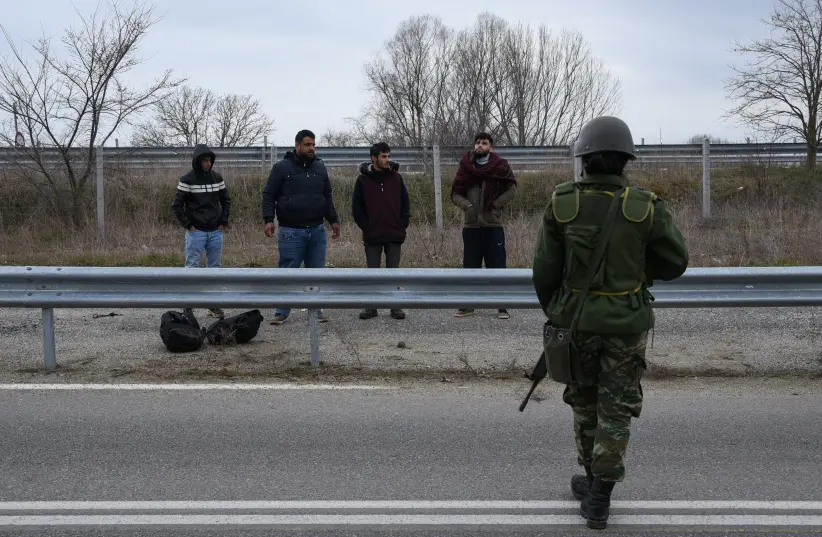Turkey wants Syrian refugees to leave
Turkey’s ruling party is claiming it will return Syrian refugees to Syria. This could include resettling a million people in Idlib, an area in northern Syria where Ankara has influence but where extremist groups tend to run the show. This could create conflict and chaos and it could also result in the violation of the rights of refugees.
However, Ankara has in the past abused Syrians and gotten a pass because it hosts millions of them, and human rights groups are afraid to critique Ankara. The Turkish ruling party also has close relationships with some western media and is able to use them to spin its policies.
Where Turkey doesn’t have a relationship with media, apparently, is in Iran. Tasnim News now has an extensive report on the “controversial” project Ankara may undertake in Syria. Why does Iran care? Because Iran supports the Syrian regime.
According to Tasnim News Agency, Erdogan’s controversial action in Idlib, Syria, was widely covered by the Turkish media. “The ruling AKP, as the ruling party in Turkey, with its huge propaganda machine, seeks to make the return of Syrian refugees to their country an important epic and humanitarian action. In this regard, 50,000 housing units in Idlib were built by Turkey and handed over to the displaced Syrians,” the report said.
Turkey’s President Recep Tayyip “Erdogan spoke live to the audience via video conference, claiming that the voluntary repatriation of one million Syrian refugees is on the government’s agenda,” Tasnim claims.
Iran’s media notes that Turkey is building cheap homes for the refugees, built from cinderblocks or “Briquettes which are actually bricks, and in the construction of houses built by the Erdogan government for the displaced, a type of clay has been used, the composition of which includes coal powder and some bituminous materials.”
Iran’s media is very interested in the type of construction. “These bricks are a good alternative to bricks and cement blocks. Because to build a concrete block, in addition to sand, cement and water, production force and high transportation costs are required. But charcoal briquettes are light and inexpensive, quick and easy to make, and transport and walling are very fast and cost-effective.”
“Turkish President Recep Tayyip Erdogan has tried to present his country as a savior who cares about the Syrian people,” Iran’s media notes.
“However, the situation on the ground is different, and Turkey’s dual and contradictory policies in the face of developments in Syria raise the following questions.”
These questions are interesting. Iran asks what Turkey will do with the armed groups it backs in Syria. It says that Turkey has equipped some 120,000 fighters in Syria and this is costing Turkey millions of dollars. “Is Erdogan willing to disband this illegal army in order to normalize Ankara-Damascus relations and bring the displaced people back completely?”
Meanwhile, Iran cares about the relationship with Russia in Syria. But Iran and Russia back the Syrian regime, but Iran has different goals than Russia. In the report, Iran alleges that Turkey has armed extremists in Syria.
“It is said that Erdogan’s personal and unilateral mistakes and decisions in foreign policy have put heavy costs on Turkey, and turning back and forth in Turkey’s relations with the Zionist regime, the UAE, Saudi Arabia and Egypt is an inevitable strategy. It remains to be seen whether this rotation will include Syria.” What is Iran saying here? It is concerned that Turkey’s reconciliation with Israel might influence its policies.
Iran also notes that many Syrians have now centered their lives in Turkey. There are large numbers of Syrian companies and professionals in Turkey.
“Political analysts in Turkey believe that Erdogan’s wrong policies have exacerbated the Syrian crisis, leading to a wave of regional insecurity and the loss of present and future capital. Is the Erdogan government willing to openly admit its mistake?”
Recommended by
Iran’s media says that “in the end, the issue of the return of Syrian refugees to their country has changed from a humanitarian and tragic issue to a purely political one, and each of the two poles of Erdogan and his opponents is trying to achieve their goals in a different way. Let their party exploit this issue politically.” The report suggests that this will influence the upcoming Turkish elections.
Why does Iran care? Iran has long wondered whether Turkey will continue to work closely with Tehran or drift away toward the Gulf. Iran wants to use Syria as a platform to base its weapons to attack Israel. It may increase its transfer of weapons if it thinks that Ankara is distracted by elections and trying to remove Syrians from Turkey.
Iran will also pay close attention to whether Turkey’s policy will destabilize Syria. Iran can benefit here, but it also doesn’t want too much chaos. It wants distraction so it can move weapons to Hezbollah.
Source: https://www.jpost.com/middle-east
